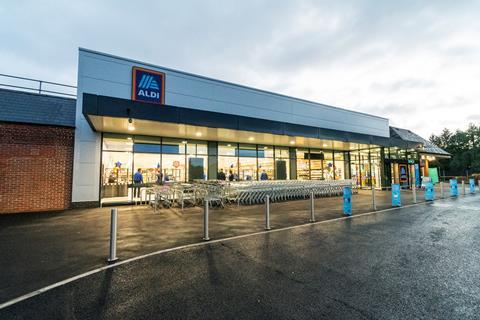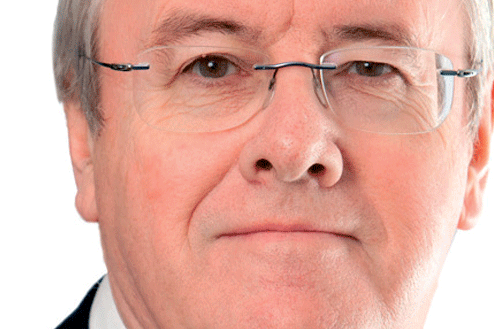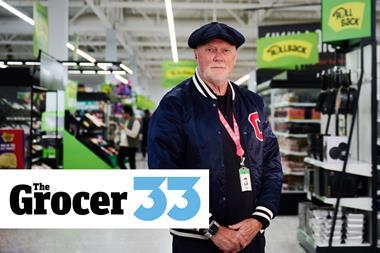
Aldi has widened the gap on Morrisons in market share as the cost of living crisis drives more shoppers to the discounters.
Aldi’s share in the 12 weeks to 2 October was 9.3%, according to new Kantar data released today. It’s the same as it was in Kantar’s previous 12-week period, to 4 September, when Aldi overtook Morrisons to become the UK’s fourth biggest supermarket.
Meanwhile, Morrisons’ share has dipped slightly, from 9.1% to 9%.
Against a 4.8% rise in total take-home grocery sales, Lidl’s sales were up 20.9% in the latest 12 weeks, making it the fastest growing supermarket for the fifth month in a row. It leaves its share at 7.1%, compared with 6.2% a year earlier.
Aldi was the second fastest growing, with sales up 20.7% compared with a year earlier, when its share was 8%.
Morrisons was the only one of the traditional big four supermarkets to see sales fall, by 3.9%, while Asda enjoyed the fastest growth of the big four, at 4.5%. Asda attracted an additional 417,000 customers compared with last year, and nearly two-thirds of all its shoppers picked up at least one Just Essentials item, showing the budget range was helping drive growth, according to Kantar.
Sales were up 3% at Sainsbury’s, 2.5% at Tesco, 5.3% at both Iceland and Ocado and 3.3% at Co-op.
It came as grocery price inflation hit another new peak, to stand at 13.9%, a record since Kantar began tracking it during the 2008 financial crash.
“The cost of living crisis is still hitting people hard at the checkouts and this latest data will make tough reading for many,” said Fraser McKevitt, Kantar head of retail and consumer insight.
“Based on our numbers, the average household is facing a £643 jump in their annual grocery bill to £5,265 if they continue to buy the same items. Taking that at a basket level, that’s an extra £3.04 on top of the cost of the average shopping trip last year, which was £21.89.”
Supermarket own label sales increased 8.1% while branded lines dropped 0.7% as shoppers sought to save money.
McKevitt said people were also looking for ways to save without changing their diet, including opting for ‘wonky veg’.
Read more: ‘They’re using us as a first-stop shop.’ How Aldi is changing the way we shop
“We’ve seen grocers making a virtue of visually imperfect fruit and vegetables in recent years, allowing them to carry on offering the fresh products consumers want but at a cheaper price,” he said. “Many shoppers have been converted and sales of ranges like Tesco Perfectly Imperfect or Morrisons Naturally Wonky were up collectively by 38% this month.”
While buying wonky veg can help cut food waste, the latest data would suggest that is unlikely to be the motivating factor behind the increase, with price rises trumping sustainability as a concern for shoppers. “The proportion of British shoppers who try to buy products with more environmentally-friendly packaging has slipped to 59%, down from 62% last year,” added McKevitt.
With energy bills soaring, shoppers are also looking for cheaper ways to cook. Sales of cooking appliances including slow cookers, air fryers and sandwich makers, which generally use less energy, were up 53%.
Sales of duvets and electric blankets rose 8% while candles were up 9%, suggesting people may be preparing for possible winter blackouts, according to Kantar.
Another standout from the latest data was an 18% surge in marmalade sales as the nation paid its respects to the Queen, said McKevitt.
| Kantar’s latest data | |||||||
|---|---|---|---|---|---|---|---|
| Total till roll - consumer spend | 12 weeks to 03 Oct 2021 | Share | 12 weeks to 02 Oct 2022 | Share | Change YoY | ||
| £m | % | £m | % | % | |||
| Total grocers | 28,766 | 100 | 30,139 | 100 | 4.8 | ||
| Total multiples | 28,273 | 98.3 | 29,652 | 98.4 | 4.9 | ||
| Tesco | 7,930 | 27.6 | 8,128 | 27.0 | 2.5 | ||
| Sainsbury’s | 4,287 | 14.9 | 4,416 | 14.7 | 3.0 | ||
| Asda | 4,133 | 14.4 | 4,320 | 14.3 | 4.5 | ||
| Morrisons | 2,833 | 9.8 | 2,723 | 9.0 | –3.9 | ||
| Aldi | 2,310 | 8.0 | 2,788 | 9.3 | 20.7 | ||
| Lidl | 1,777 | 6.2 | 2,150 | 7.1 | 20.9 | ||
| Co-op | 1,854 | 6.4 | 1,916 | 6.4 | 3.3 | ||
| Waitrose | 1,463 | 5.1 | 1,418 | 4.7 | –3.1 | ||
| Iceland | 659 | 2.3 | 694 | 2.3 | 5.3 | ||
| Ocado | 471 | 1.6 | 496 | 1.6 | 5.3 | ||
| Other multiples | 555 | 1.9 | 602 | 2.0 | 8.4 | ||
| Symbols & independents | 492 | 1.7 | 487 | 1.6 | –1.0 | ||
| Source: Kantar | |||||||



















No comments yet